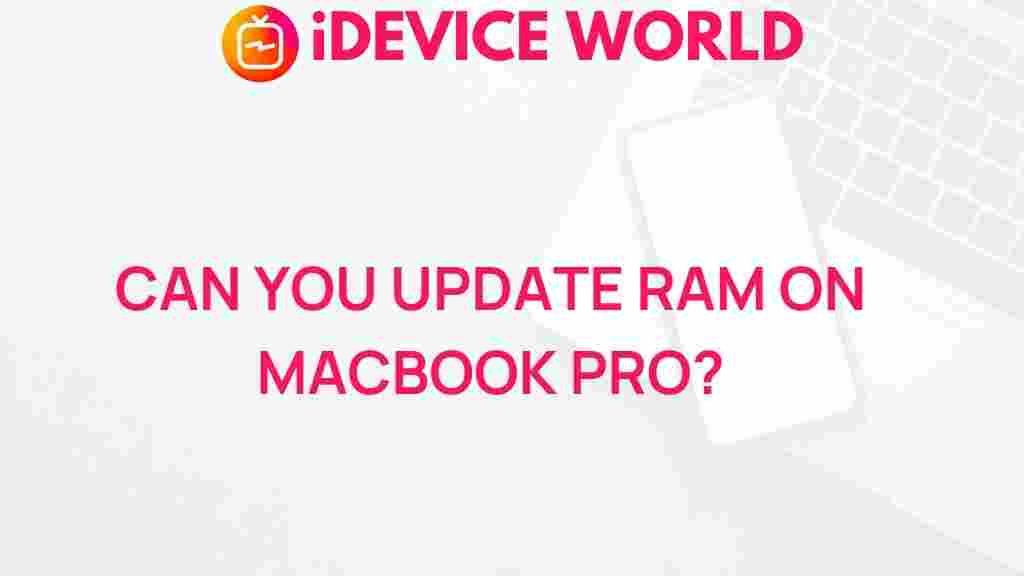Unveiling the Mystery: Upgrading RAM on MacBook Pro
If you’re a MacBook Pro user, you might have noticed that your device isn’t performing as well as it used to. Whether you’re running demanding applications, editing videos, or multitasking, having insufficient RAM can significantly slow down your machine. Upgrading your RAM is one of the best ways to enhance performance, but many users are unsure about how to do it. In this article, we will guide you through the process of upgrading RAM on your MacBook Pro, including troubleshooting tips and best practices.
Why Upgrade RAM on MacBook Pro?
Before diving into the upgrade process, let’s discuss why you might consider upgrading your RAM:
- Improved Performance: More RAM allows your MacBook Pro to handle more tasks simultaneously, improving overall performance.
- Better Multitasking: With additional RAM, you can switch between applications smoothly without experiencing lag.
- Future-Proofing: As software becomes more resource-intensive, upgrading your RAM can help ensure your MacBook Pro remains functional for years to come.
How Much RAM Do You Need for Your MacBook Pro?
The amount of RAM you need depends on how you use your MacBook Pro. Here are some general guidelines:
- 8GB: Suitable for basic tasks like browsing, word processing, and watching videos.
- 16GB: Ideal for most users, including students and professionals who use multiple applications.
- 32GB or More: Recommended for heavy users, such as video editors, graphic designers, and developers.
Preparing for the Upgrade
Before starting the upgrade process, gather the necessary tools and information:
- Compatible RAM Modules: Check your MacBook Pro model to find compatible RAM. You can use Crucial’s Memory Advisor to find the right RAM.
- Screwdriver: You will need a pentalobe screwdriver to open your MacBook Pro.
- Anti-Static Wrist Strap: To prevent static electricity from damaging your components.
Step-by-Step Guide to Upgrade RAM on MacBook Pro
Now that you’re prepared, follow these steps to upgrade your MacBook Pro’s RAM:
Step 1: Backup Your Data
Before making any hardware changes, it’s crucial to back up your data. Use Time Machine or another backup solution to ensure your files are safe.
Step 2: Shut Down Your MacBook Pro
Power down your MacBook Pro completely and disconnect it from any power source.
Step 3: Open the Back Cover
Using your pentalobe screwdriver, remove the screws securing the back cover. Keep track of the screws as you remove them.
Step 4: Locate the RAM Slots
Once the back cover is removed, locate the RAM slots. Depending on your MacBook Pro model, there may be one or two slots available.
Step 5: Remove the Old RAM (if applicable)
If you’re replacing existing RAM, gently release the clips on either side of the RAM module and lift it out of the slot.
Step 6: Install the New RAM
Align the notches on the new RAM module with the slot and gently press it down until the clips click into place. Ensure the RAM is securely installed.
Step 7: Reassemble Your MacBook Pro
Carefully replace the back cover and screw it back into place. Make sure all screws are tightened properly.
Step 8: Power On Your MacBook Pro
Reconnect your power source and turn on your MacBook Pro. Your system should recognize the new RAM automatically.
Troubleshooting Tips
If your MacBook Pro does not boot or fails to recognize the new RAM, consider these troubleshooting steps:
- Check Compatibility: Ensure that the RAM you installed is compatible with your specific MacBook Pro model.
- Reseat the RAM: If the RAM isn’t seated properly, it may not function. Remove and reinsert the RAM to ensure a proper fit.
- Reset the SMC: Sometimes resetting the System Management Controller (SMC) can resolve hardware recognition issues.
Conclusion
Upgrading the RAM on your MacBook Pro can breathe new life into your device, enhancing its performance and allowing you to handle demanding tasks with ease. By following the steps outlined in this article, you can successfully upgrade your RAM and enjoy a faster, more efficient machine.
Remember to always back up your data and ensure compatibility before starting the upgrade process. If you’re uncertain or uncomfortable with performing the upgrade yourself, consider seeking assistance from a professional technician.
For more detailed guides and tips on maintaining your MacBook Pro, check out our other articles here. Happy upgrading!
This article is in the category Guides & Tutorials and created by iDeciveWorld Team

1 thought on “Unveiling the Mystery: Upgrading RAM on MacBook Pro”